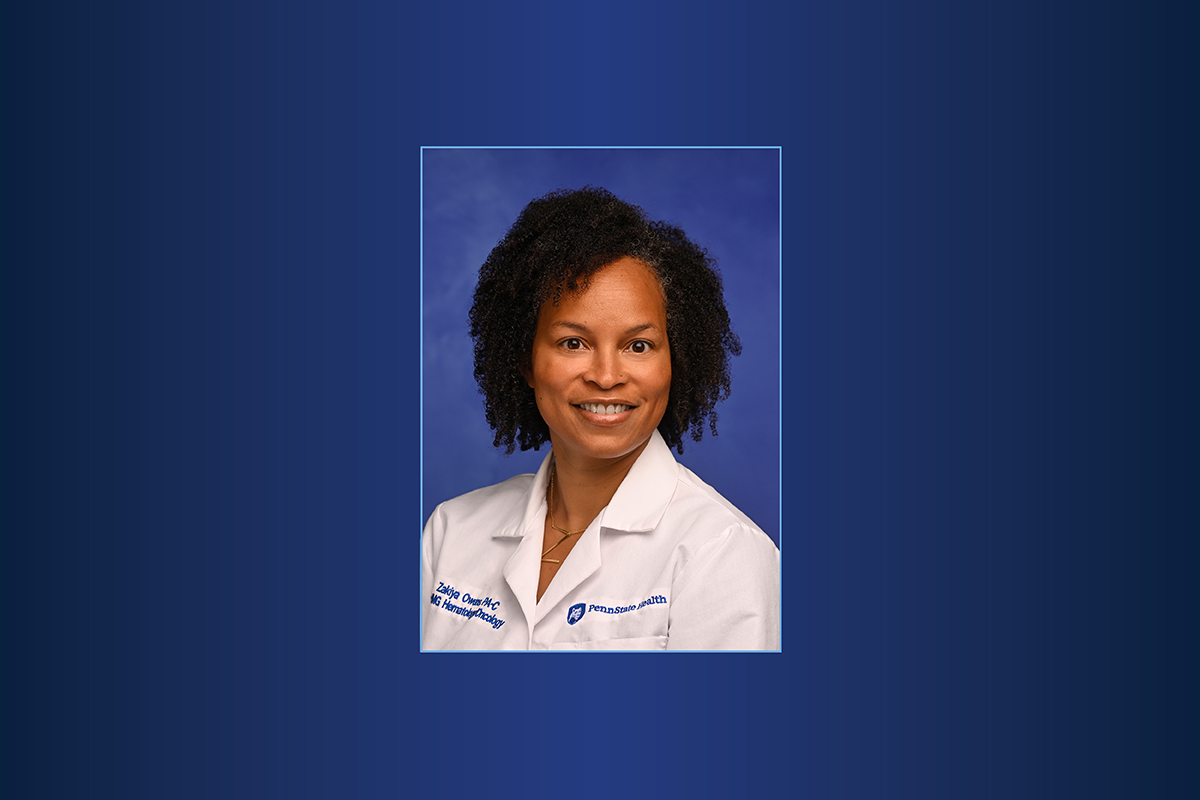Advanced Practice Provider Spotlight: Physician assistant shares insights on caring for diverse patients

Advanced practice providers (APPs) play an integral role in meeting the needs of Penn State Health’s increasingly diverse patient populations. With their advanced training and credentials, these professionals expand access to high-quality care, build trust with patients and are a valuable aspect of patients’ overall experience.
This is the first of two stories on physician assistants in our APP Spotlight series.
Zakiya Owens, a physician assistant at Penn State Health Medical Group ─ Andrews Patel Hematology/Oncology in Harrisburg, said she always had an interest in health and wellness. She was fascinated by the ways medicine evolves and changes as knowledge increases on how the human body functions and interacts with the world.
Owens earned an undergraduate degree in animal science with a focus on bioscience and technology and a master’s degree in management of technology, both from the University of New Hampshire. After working in pharmaceutical sales for several years and driven to be more directly involved in patient care, she earned a second master’s degree in physician assistant studies from Pace University. She has worked as a physician assistant with Penn State Health for more than five years.
Diversity in care can improve patient experience
Physician assistants are predominately white and female, Owens noted. Comparing the latest census data with the demographics of physician assistants shows that Latinos and African Americans are underrepresented in the field. Reflecting on her personal challenges with diversity, Owens said that she has sometimes felt lonely as one of the few diverse physician assistants not only at Penn State Health but in other professional settings such as conferences.
“When you are one of the few, you experience a different kind of pressure to be a good representative, a great example, with the hopes that you may open the door for others who look like you to be accepted and feel comfortable in these spaces,” she said. “It can be hard to quantify the impact of microaggressions or the extra lift it takes to overcome bias, but I know those are added challenges that impact how I approach patients, colleagues and my role as a physician assistant.”
Owens believes more diverse care providers can improve the patient experience. To increase diversity in the highly ranked and competitive physician assistant field, she said, young people of color need more information about the field and greater exposure to the opportunities it offers, adding that it’s equally important to create programs that aim to diversify the field.
Penn State Health serves an increasingly diverse patient population. Owens said before she began working for the health system, she had no experience with patients from Amish or Mennonite backgrounds. Attending one of the many educational diversity events at Penn State Health gave her better insight on how to address the concerns of these patients and speak to their values. As a result, she has become more flexible in how she interacts with patients to provide the most respectful care possible.
“How we approach medicine and deal with illness, difficult diagnoses, death and treatment varies widely among cultures, races and ages,” Owens said. “Trying to maintain a judgment-free zone, stay curious, ask lots of questions and maintain an awareness of your own possible biases can be challenging on top of the medicine itself. I have learned to ask more questions, engage with family when that is valued and respect every patient’s right to make the decisions that align with their priorities and values.”
How to become a physician assistant
Most physician assistants (PAs) must earn a bachelor’s degree and complete at least three years of health care service before completing an approved PA program. The program typically requires an additional three years of education and clinical experience, after which PAs must pass a five-hour certification exam and then become licensed in their state.
Their patient care responsibilities include:
- Conducting physical exams
- Diagnosing and treating illnesses and acute and chronic conditions
- Ordering and performing diagnostic tests
- Performing medical procedures
- Prescribing medications and developing treatment plans
- Assisting in surgery
- Providing guidance on disease prevention and healthy living
The advance practice providers at Penn State Health include certified registered nurse practitioners, physician assistants, certified registered nurse anesthetists, certified nurse midwives and clinical nurse specialists. Rigorously trained and credentialed, APPs work collaboratively with other health care providers to offer patients the highest level of care possible. See the previous APP Spotlight feature on certified registered nurse anesthetists
If you're having trouble accessing this content, or would like it in another format, please email Penn State Health Marketing & Communications.
